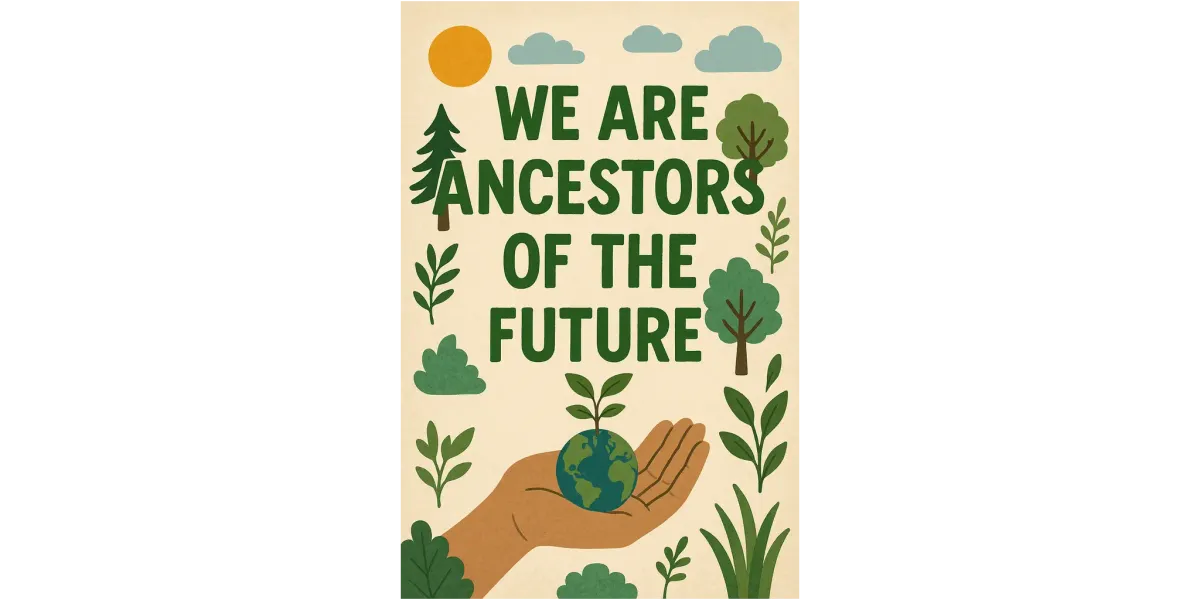We Are the Ancestors of What Follows

We often think of ourselves as the end result of history’s long arc. The inheritors. The living echoes of those who came before. And while that’s true, it’s not the whole truth.
Because we’re not just descendants—we’re ancestors, too. Whether we acknowledge it or not, we are laying the foundation for lives we will never see. The future isn’t some abstract idea waiting to arrive—it’s being shaped by the sum of our decisions, right now. Every time we choose convenience over conscience, or courage over comfort, we are setting the terms of tomorrow’s world. That makes us architects. Stewards. For better or worse, we are becoming the stories future generations will tell about how it all turned out. Will they see us as the ones who looked away—or the ones who stepped up?
Earth Day was born from protest. From a generation that looked around and said, “This isn’t good enough.” They saw oil-soaked rivers catching fire, lungs choked by smog, and children growing up without clean air or water—and they refused to accept that as normal. That spirit wasn’t polite. It wasn’t convenient. It was raw and urgent and necessary. And it worked. Laws changed. Awareness grew. For a moment, the tide began to turn. But movements, like ecosystems, need tending. Complacency crept in. Corporate interests co-opted the language of sustainability without honoring its meaning. And now, the world they tried to save teeters closer to collapse than ever before. That same spirit—the one that said enough—isn’t a relic of the past. It’s a call to action now.
We like to pretend we’re separate from nature. That we’ve somehow risen above it, mastered it, tamed it. We build walls, pave over wetlands, pump carbon into the sky, and tell ourselves it’s progress. But the truth is simpler—and more humbling: we are not above nature. We are of it. The air we breathe, the water we drink, the food we eat—they’re not conveniences. They’re dependencies. And when the ecosystems that sustain those essentials begin to unravel, so do we. There is no “environment” out there, apart from us. There is only the living world, and we’re embedded in it—cells within a larger organism. When we poison the soil, we eat the consequences. When we deforest the land, we destabilize the climate we rely on. The crisis isn’t happening to the planet. It’s happening to us.
We’ve been sold a version of progress where comfort is king. A world of single-use plastics, overnight shipping, and climate-controlled everything. It’s seductive, no doubt. But it’s also a trap. Our conveniences come at a cost we’ve outsourced and ignored. Sweatshops. Landfills. Collapsing fisheries. Deforested hillsides. We hide the damage behind slogans like eco-friendly or green-certified, but the damage is real—and mounting. True progress isn’t about more comfort. It’s about more clarity. And if that clarity makes us uncomfortable, good. Discomfort wakes us up. It shakes loose the illusion that business as usual is working. This is where radical responsibility comes in. We don’t need to be perfect—we need to be honest. Honest about our impact. Honest about our habits. And honest about the power we have to change them.
We won’t be here forever. But what we leave behind will be. The question isn’t whether we’ll leave a mark—it’s what kind of mark it will be. Will we be remembered as the generation that looked away, or the one that turned the tide? As ancestors who squandered the moment, or those who met it with courage? Legacy isn’t carved in monuments. It’s planted in forests. It’s restored in wetlands. It’s measured in clean air, in safe drinking water, in the hands of children who inherit not just the problems—but also the tools to solve them.
To think seven generations ahead isn’t naïve—it’s necessary. The world we shape today will ripple through time in ways we can’t fully imagine. Our decisions—how we eat, vote, build, and speak—will become the invisible scaffolding of someone else’s life. We owe them more than hope. We owe them a world still capable of renewal. A world where forests grow tall, oceans breathe, and the seasons still know their rhythm. We owe them the dignity of choice—to inherit a world they can shape, not just survive. And we owe them proof. Proof that we cared enough to change while change was still possible.
It’s easy to feel overwhelmed. The scale of the crisis is massive, and the systems at fault seem immovable. But change doesn’t begin with systems. It begins with people. Small acts matter—because they multiply. A single plastic-free habit becomes a ripple in your community. A conversation about local food inspires a neighbor. A choice to bike or bus plants a seed in someone else’s mind. That’s how momentum begins. This isn’t about guilt—it’s about agency. You’re not powerless. In fact, you’re more powerful than you think. Because the most dangerous lie we’ve been sold is that individual actions don’t matter. They do. They always have.
Start small:
-
Refuse what you don’t need
-
Reduce what you do
-
Repair before replacing
-
Reconnect with your place in the world
And speak up. Systemic change is only possible when enough voices demand it.
Act like someone’s counting on you—because they are. The window is closing. Every delay becomes a debt the next generation has to pay—with their health, their homes, their future. We can’t wait for perfect plans or political permission. We don’t need more awareness. We need action.
Pick one thing. Start today. Refuse the plastic. Plant the tree. Write the letter. Speak the truth. Let it be imperfect, but let it be real. Because when the history of this moment is written, it won’t ask what we hoped for. It will ask what we did. Be the ancestor who answered with action.
